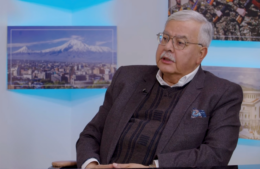Gülen Movement Has Spent 1.5 Million Dollars for Lobbying Against Armenian Genocide Recognition
- (0)
Gülen Movement Has Spent 1.5 Million Dollars for Lobbying Against Armenian Genocide Recognition –
Fethullah Gülen
The supporters of the ideology of the Gülen movement in Turkey and the U.S.A. in the last 8 years have spent 1.5 million dollars for lobbying against the Armenian Genocide recognition. According to the Turkish “Haber 10″ news website, citing the American Buzzfeed website.
Since 2007 Gülen movement has lobbied against the recognition of the Armenian Genocide and made donations totaling $1.5 million to U.S. political campaigns. Among those who have received donations are listed such persons, as U.S. President Barack Obama, former Secretary of State Hillary Clinton and others.
Muhammed Fethullah Gülen (born 27 April 1941) is a Turkish preacher, former imam, writer, and Islamic opinion leader. He is the founder of the Gülen movement (sometimes known as Hizmet). He currently lives in a self-imposed exile in Saylorsburg, Pennsylvania, United States. Gülen teaches an Anatolian (Hanafi) version of Islam, deriving from Sunni Muslim scholar Said Nursî’s teachings. Gülen is actively involved in the societal debate concerning the future of the Turkish state, and Islam in the modern world. He has been described in the English-language media as “one of the world’s most important Muslim figures. However, his Gülen movement has been described as “having the characteristics of a cult” and its secretiveness and influence in Turkish politics likened to “an Islamic Opus Dei”. The Gülen movement is a transnational Islamic civic society movement inspired by Gülen’s teachings. His teachings about hizmet (altruistic service to the “common good”) have attracted a large number of supporters in Turkey, Central Asia, and increasingly in other parts of the world. Gülen movement participants have founded a number of institutions across the world, which claim to promote interfaith and intercultural dialogue activities.
The Gülen movement has millions of followers in Turkey, as well as many more abroad. Beyond the schools established by Gülen’s followers, it is believed that many Gülenists hold positions of power in Turkey’s police forces and judiciary. Turkish and foreign analysts believe Gülen also has sympathizers in the Turkish parliament and that his movement controls the widely-read Islamic conservative Zaman newspaper, the private Bank Asya bank, the Samanyolu TV television station, and many other media and business organizations, including the Turkish Confederation of Businessmen and Industrialists (TUSKON).
Despite Gülen’s and his followers’ claim that the organization is non-political in nature, analysts believe that a number of corruption-related arrests made against allies of Turkish Prime Minister Recep Tayyip Erdogan reflect a growing political power struggle between Gulen and the Prime minister. These arrests led to the 2013 corruption scandal in Turkey, which the ruling Justice and Development Party (AKP)’s supporters (along with Erdogan himself) and the opposition parties alike have said was choreographed by Gülen after Erdogan’s government came to the decision early in December 2013 to shut down many of his movement’s private Islamic schools in Turkey.




















